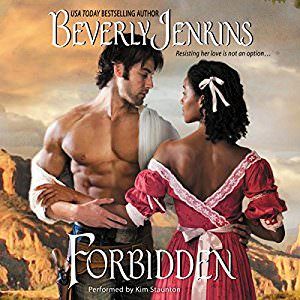American historical romance fans are surely familiar with Beverly Jenkins’ romances set in the Old West. Beyond the breath of fresh air that is a historical romance set in the United States, Ms. Jenkins is also well known for tackling the difficult subject of slavery and its aftermath in early America – in this case, immediately following the American Civil War. Forbidden features a romance between an African American heroine (who is a descendant of African queens) and a seemingly white man, who is in fact the product of a relationship between his plantation owner father and one of his slaves. The author addresses some very serious and sensitive topics such as race relationships, interracial marriages, segregation, and how life differed on the frontier (in this case a small town named Virginia City in Nevada) as compared to “the South” in the 19th century.
When Rhine Fontaine took a chance to start a new life by moving west, he made the hard decision to “cross over”. Being a light skinned man with light eyes, he was often assumed to be white, and after having experienced the cruel realities of how slaves, even if the son of the plantation owner, were treated, he decided that, to build his dreams of being a successful business man, he was going to make his life easier by passing as a white man.
Although he crossed over, however, he didn’t turn his back on his race, as he made sure that all his businesses were open to people of all races, even if it did cost him the business of the most prejudiced whites. Utilizing the business approach, Rhine turns a small fortune given to him by his white half-brother (the one family member who does fully accept him) into an empire, as Rhine ultimately ends up owning much of the real estate of the town of Virginia City, including a casino which features prominently in the story. He also becomes one of the town’s politicians and through this lens we get to see how tense the political climate is even this far out in the Old West when topics such as school segregation are discussed.
Rhine is traveling when he comes across a woman who has been left for dead in the desert. Rhine and his friend take it upon themselves to save this woman who turns out to be Eddy Carmichael. Eddy is so weak that it takes a number of days for her to recover sufficiently from her dehydration to be able to get back on her feet. It is during this period of time, while she is at his home, that Rhine gets to know – and begins to love – Eddy. He can tell what a good woman she is – humble and hardworking – and he is amazed at how much more attraction he feels to her than to his own fiancée, a white woman to whom he got engaged primarily as a business relationship and who ironically turns out to be one of the most prejudiced women in the town. He learns this when she begins a campaign to get him to stop opening his businesses to non-whites.
But openly loving, much less marrying Eddy, would mean Rhine loses his political position, some of his business (as the author explains, even loans from a non-white man could be disregarded because the law wouldn’t enforce the payment of them) as well as the life he has lived in Virginia City. The town will never accept an interracial marriage and publicly acknowledging his true race means that even if he is still the town’s wealthiest man, many will no longer welcome him in their circles or patronize his establishments. Can there possibly be a HEA under the circumstances?
I really enjoyed the historical nature of this listen and how Ms. Jenkins delicately handled the subject of prejudice – a subject that still unfortunately plagues the US although thankfully in much less pervasive form. Now with all that said, I must caution listeners that the development of this story is definitely on the slow side. I don’t know if it’s a factor of the subject matter which required quite a bit of background setting or just the story in general, but I was well into the book (close to the mid-way point) before I felt like we were actually moving to the romance – and even then, this is not a romance that will blow you over or that steals the show. As you can imagine, the emphasis is on the community and race relations, and the romance takes more of a backseat to the historical aspects of this novel.
I must admit that the narration by Kim Staunton also took some time to get into. Ms. Staunton has a very slow cadence. Perhaps this is not unexpected given the characters she was portraying, most of whom had roots from the South (where a slower drawl sometimes is the norm). However, I found my attention wandering at normal speed, so I ultimately had to listen to this book at 1.5X the normal speed (the fastest setting the app I was listening to this book on would go). Even at this accelerated rate, however, the delivery still felt slow to me. I was eventually able to settle into it and came to the conclusion that while this style may not work in all cases, in this case, Ms. Staunton’s style was perhaps true to the subject matter.
However, listeners should be aware that Ms. Staunton does not greatly differentiate between the voices of the various characters. For example, the pitch of the heroine’s and hero’s voices are very similar. This made it difficult to rely on her voice alone to know who was speaking. Fortunately, there are sufficient dialogue tags to let the listener know who is speaking.
Ms. Staunton’s style did have the benefit of sounding like I was sitting and listening to someone tell me a story. Her delivery almost reminded me of what it would be like to sit by a campfire and have a family member retell a legend or true story from the past, which certainly has its own appeal (though it’s unlike the typical narration style used in most romance audiobooks today, but perhaps more fitting for historical fiction).
All in all, I’m happy I listened to Forbidden. This is a listen that definitely stands out and which I will remember for a long time for its unique storyline. Moreover, while not totally unexpected, its retelling of the political climate and race relations of our US history was still eye opening and certainly serves as a great cautionary note as to how prejudices left unchecked can harm society. At the same time, it stands for the proposition that true happiness can only be experienced if we are true to ourselves. This was my first Beverly Jenkins listen, but I know it will not be my last.
BJ
Buy Forbidden by Beverly Jenkins on Amazon




